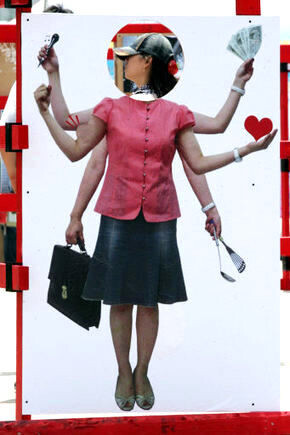hankyoreh
Links to other country sites 다른 나라 사이트 링크
Korea’s gender divide displayed by U.N. figures

The quality of life for South Koreans ranked 26th on the United Nations’ Human Development Index (HDI), but Korean women ranked 53rd on the same body’s Gender Empowerment Measure (GEM), indicating South Korea’s marked gender disparity.
The Hankyoreh analyzed 2006 data released by the United Nations Development Program (UNDP) November 9 and it found that Norway was the first out of 177 nations in terms of human development, measured by factors such as average life span, level of education, literacy rate, and GDP. In the GEM survey - assessed by looking at the number of female legislators, senior officials and managers, professional and technical workers, and the ratio of female to male earned income - the North European nation occupied the top position, as well.
Iceland, which was second on the HDI, ranked 3rd on the GEM, and Sweden, which was 5th on the development index, ranked 2nd on the GEM. Most of the top nations on the HDI had similar rankings on the GEM.
Korea’s numbers mark a sharp contrast from that trend. It means that even if South Korean males and females receive equal education, females hold a lower level of political, economic, and social status. In South Korea, female legislators make up 13.4 percent, compared to the world average of 18.54 percent; female administrative managers comprise 7 percent of the total (world average: 28.30 percent); the number of women professional and technical workers stands at 38 percent of that group (world average: 48.48 percent), and the ratio of female to male earned income is 0.46 (world average: 0.53).
Japan and Ireland also showed a problem of disparity. Japan was 7th on the HDI, while 42nd on the GEM; Ireland was in 4th place on the HDI and 17th on the GEM. These two nations have a strong tradition of gender discrimination in terms of education and household affairs.
South Korea’s low GEM was mainly due to the disparity in the ratio of female to male managers. Korean women cannot maintain their careers because of traditional expectations involving marriage and stay-at-home childcare. According to the employment equality index recently released by the Korea Labor Institute, the number of women managers numbered only 8.1 per 100 men last year. The index showed that women’s employment status was about half that of men.
Bae Min Geun at the LG Economic Research Institute said, "Unlike the gender disparity that used to be due to inferior education for females, sexual disparity still exists even if women obtain the same level of education as men do."
Meanwhile, nations like Belgium and Germany showed a higher GEM than HDI. Belgium was 13th in HDI and 5th in GEM, while Germany ranked 21st and 9th, respectively.
Editorial・opinion
![[Editorial] Does Yoon think the Korean public is wrong? [Editorial] Does Yoon think the Korean public is wrong?](https://flexible.img.hani.co.kr/flexible/normal/500/300/imgdb/original/2024/0417/8517133419684774.jpg) [Editorial] Does Yoon think the Korean public is wrong?
[Editorial] Does Yoon think the Korean public is wrong?![[Editorial] As it bolsters its alliance with US, Japan must be accountable for past [Editorial] As it bolsters its alliance with US, Japan must be accountable for past](https://flexible.img.hani.co.kr/flexible/normal/500/300/imgdb/original/2024/0417/6817133413968321.jpg) [Editorial] As it bolsters its alliance with US, Japan must be accountable for past
[Editorial] As it bolsters its alliance with US, Japan must be accountable for past- [Guest essay] Amending the Constitution is Yoon’s key to leaving office in public’s good graces
- [Editorial] 10 years on, lessons of Sewol tragedy must never be forgotten
- [Column] A death blow to Korea’s prosecutor politics
- [Correspondent’s column] The US and the end of Japanese pacifism
- [Guest essay] How Korea turned its trainee doctors into monsters
- [Guest essay] As someone who helped forge Seoul-Moscow ties, their status today troubles me
- [Editorial] Koreans sent a loud and clear message to Yoon
- [Column] In Korea’s midterm elections, it’s time for accountability
Most viewed articles
- 1[Column] The clock is ticking for Korea’s first lady
- 2[Guest essay] How Korea turned its trainee doctors into monsters
- 3Samsung barricades office as unionized workers strike for better conditions
- 4S. Korea, Japan reaffirm commitment to strengthening trilateral ties with US
- 5[Editorial] When the choice is kids or career, Korea will never overcome birth rate woes
- 6Gangnam murderer says he killed “because women have always ignored me”
- 7[Editorial] As it bolsters its alliance with US, Japan must be accountable for past
- 8[News analysis] After elections, prosecutorial reform will likely make legislative agenda
- 9Korea, Japan jointly vow response to FX volatility as currencies tumble
- 10US exploring options for monitoring N. Korean sanctions beyond UN, says envoy